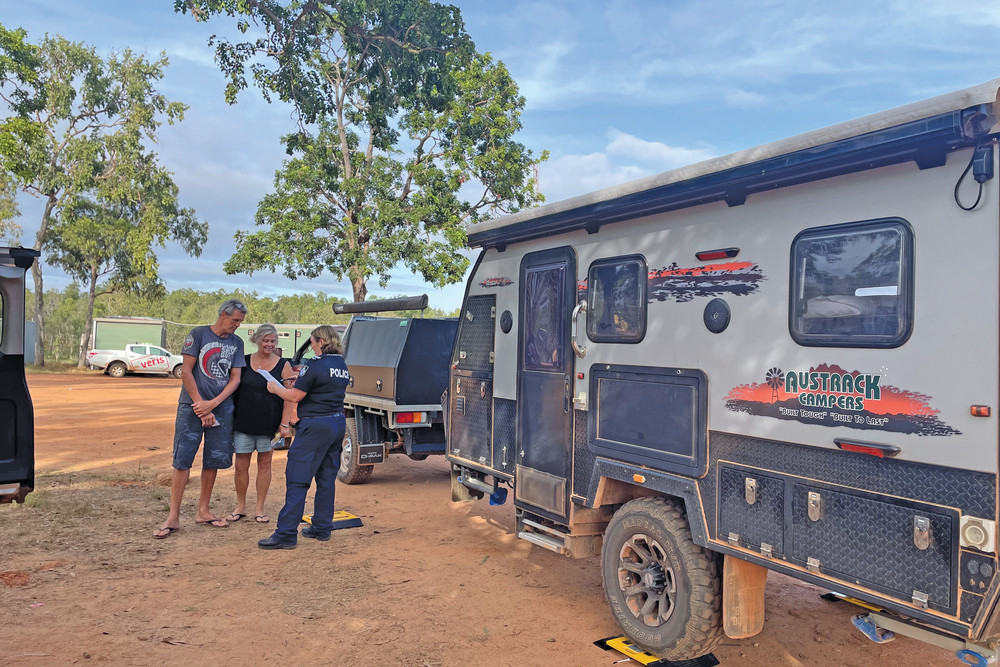Community & Business
20 July, 2022
Timely warning for caravanners
AS the rest of the country feels the increasing cold weather, the north is experiencing an influx of motorhomes and caravanners, who are taking advantage of our fabulous weather.

This Thursday, “grey nomads” will roll into Mareeba to attend the annual Christmas in July festivities held at Davies Park. With between 250-500 nomads expected to attend, swelling the already large number of visitors to the area, it is timely to remind all motorists to be patient and drive to road conditions.
Almost half of all crashes in 2020 and 2021 involving a vehicle towing a caravan and deemed to be at fault were caused by either the caravan or tow vehicle losing control.
Knowing the limits of your vehicle is important. It can have real consequences for you, your passengers and other road users.
In the Far North, it is common to have to drive on dirt roads or roads that are smaller in width, making it more difficult when towing a caravan or camper.
Senior Constable Aleda Day of Crime Prevention Tablelands said a common mistake drivers made was not knowing how much they could tow.
“We often see vehicle manufacturers advertise a certain towing capacity for their vehicles and this can give drivers a false sense of security,” Senior Constable Day said.
“Just because a vehicle manufacturer states a vehicle can tow 3.5 tonne, it does not necessarily mean that the vehicle, fully loaded with passengers, fuel and luggage, can still tow 3.5 tonne.”
She said it was important to remember that weights often included a fully fuelled car, passengers and a fully loaded caravan, as well as extras on the vehicle such as bull bars, roof racks and aftermarket tyres.
“These can add up quickly and easily push your load over the weight limit for your vehicle’s Gross Vehicle Mass (GVM) or your combination’s Gross Combination Mass (GCM),” Snr Const Day said.
“When this happens, the consequences can be serious for you, your passengers, your caravan, and other road users. When travelling with a poorly distributed load, your caravan may begin to sway or ‘snake’ which can lead to a crash.”
If faced with this, it is important for drivers to:
Remain calm. Do not panic. Do not accelerate and avoid the urge to apply the towing vehicle’s brakes.
Don’t stab at the tow vehicle’s brakes and don’t try to control the sway by steering into it.
Keep the steering wheel pointed straight ahead as much as possible.
If the trailer is fitted with electronic brakes, activate them manually using the override feature.
Gradually release the accelerator and reduce speed until the swaying stops.
Once the vehicle has regained stability, slow right down and pull off the road at the first safe opportunity.
When safe to do so, check your load is distributed correctly and your tyre pressure is correct before you start driving again.
Apart from your normal driving responsibilities, towing requires a greater degree of knowledge and skill than normal driving.
Snr Const Day said the additional weight of a caravan or trailer could have a significant impact on the way a vehicle handles on the road.
“Towing is very different to everyday driving, and it requires additional driving skills and safety precautions,” she said.
“Cornering and the braking performance of vehicles are affected when towing.
“As a driver, you have a legal responsibility to ensure the towing vehicle, trailer and its load meet all legal and safety requirements.”
Police commonly see crashes occur when a caravan overtakes, merges or changes lane and clips the front of a car travelling behind it.
“Being aware of the length of your trailer is important. This includes having additional mirrors to see the full length of your car and trailer so crashes like these don’t occur,” Snr Const Day said.
“Drivers must be able to see down the full length of their vehicle and caravan. Simply having a camera on the rear of the caravan is not sufficient and may result in enforcement action being taken.
“It is suggested that before heading out on the road and towing a caravan, drivers should consider undertaking a towing course which are offered by various agencies.”
Given the amount of caravan crashes recently, police and state roads authorities will be clamping down on overweight trailers and ignorance will not be an excuse.
Snr Const Day said all drivers, including those towing caravans or campers, needed to understand the law and take responsibility for their actions.
“If you are unsure of how much your caravan and car weigh, drop into a weighing specialist and have it weighed correctly or drop into one of the free caravan weights days being held around the far north in the coming months,” she said.


